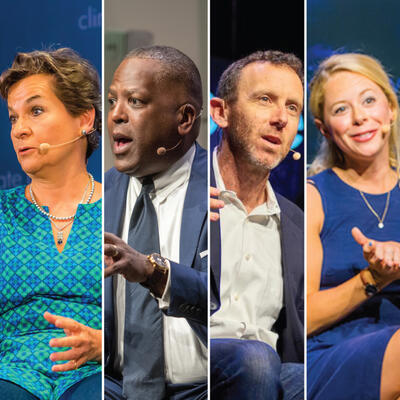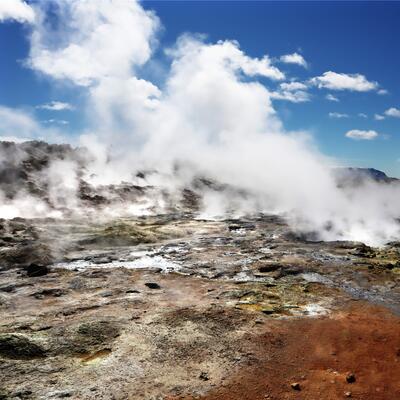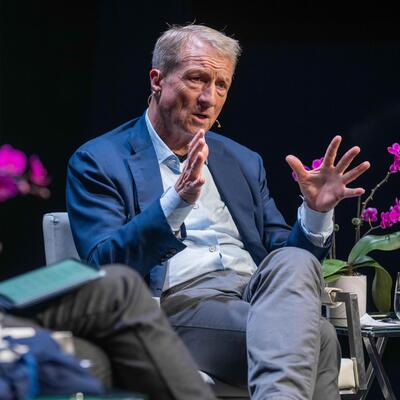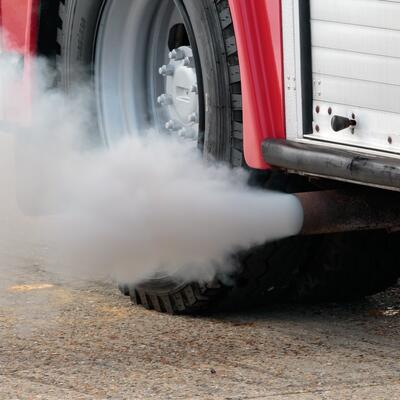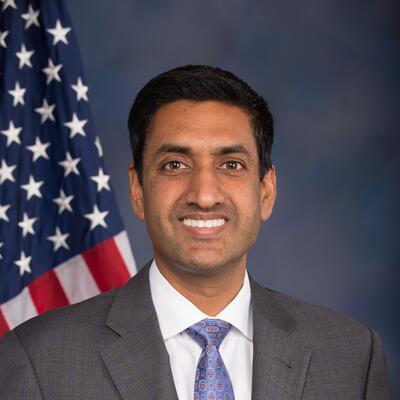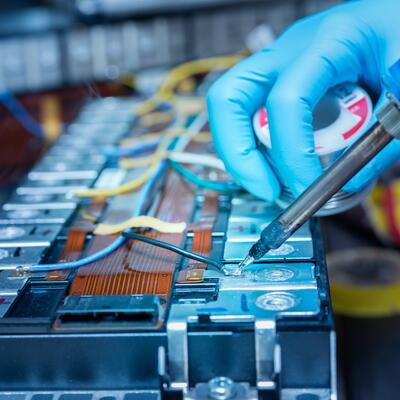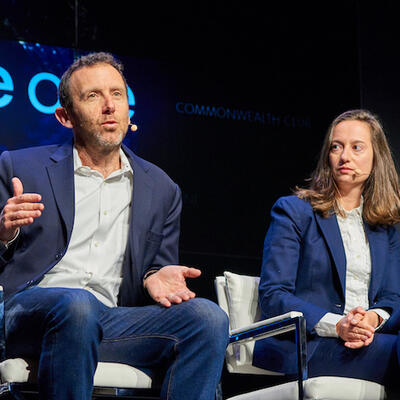
Cool Clean Tech
Guests

Lidiya Dervisheva
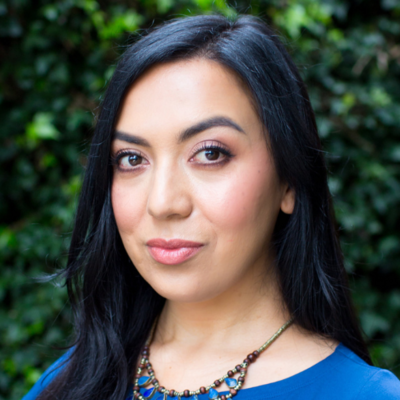
Davida Herzl
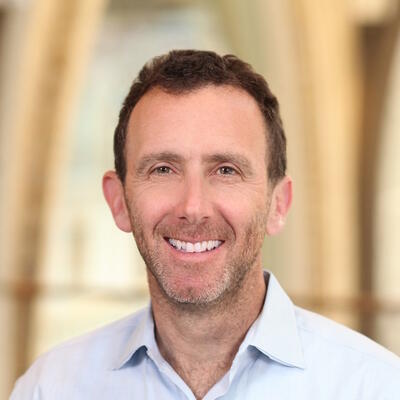
Gabriel Kra
Summary
Over a century ago, the industrial revolution brought wealth and opportunity to a generation of American innovators. It also brought us dirty coal power and a sky clogged with carbon emissions. The good news? There’s a new generation of entrepreneurs eager to make their fortune by fighting global warming. Creative start-ups are coming up with fresh, climate-friendly ideas for getting around town, powering your cell phones, and even eating breakfast. And there is a growing number of forward-thinking venture capitalist firms eager to seek out and nurture those innovative thinkers.
A discussion about clean-tech startups and how they could help save the world.
Full Transcript
Announcer: This is Climate One, changing the conversation about energy, economy and the environment.
On today’s program, news from the front lines of the clean tech revolution.
Lidiya Dervisheva: So it’s not only, you know, solar, wind, tidal and so on but it’s actually the way we use energy, the way we conserve energy. The way we figure out better ways to use the resources that we currently have.
Announcer: Creative start-ups are coming up with fresh, climate-friendly ideas for getting around town, powering your cell phones, and even eating breakfast.
Gabriel Kra: Milk, yogurts, cheeses; it turns out there's a lot of carbon embedded in that production ecosystem. So if you can just take cows out of the dairy equation then you can actually save a lot of energy and impact climate change.
Announcer: The promise of cool, clean tech. Up next on Climate One.
Announcer: Can clean-tech start-ups save the planet?
Welcome to Climate One – changing the conversation about America’s energy, economy and environment.
Over a century ago, the industrial revolution brought wealth and opportunity to a generation of American innovators. It also brought us dirty coal power and a sky clogged with carbon emissions. The good news? There’s a new generation of entrepreneurs eager to make their fortune by fighting global warming.
Today on Climate One, Greg Dalton digs into some of the exciting innovations coming our way from the world of clean tech. His guests represent three companies that are already in on the ground floor. Two are venture capitalist firms with a front-row seat to the fresh ideas needed to power our economy, and one is a start-up that’s developing new and better ways to understand our environment.
Gabriel Kra is Managing Director at Prelude Ventures. Lidiya Dervisheva is an Associate at G2VP. And Davida Herzl is the co-founder and CEO of Aclima.
Here’s Greg Dalton.
Greg Dalton: Davida, let's begin with you. Climate infrastructure is often by governments with scientists for government scientists and you're kind of democratizing that with hyper local data. So tell us how Aclima is doing that.
Davida Herzl: So we’re filling the critical need around the world for hyper local emissions and pollution data. Now that we know that we are facing a climate crisis that is intricately connected with health impacts from those same emissions, we need data hyper locally to really understand and manage those emissions, right. The foundation of managing risk is measurement. And so we’re leveraging a lot of advances in technology that we all hear about every day from ubiquitous computing to ubiquitous communications. The capability now to really shrink sensors down to something that can fit in the palm of your hand and merging all of those technologies together to be able to build distributed sensor networks that measure all of the pollutants that are important for human health or that impact human health. All of the core greenhouse gases and be able to do it at a fraction of the cost from traditional methods and do it in a way at that makes that data broadly accessible for decision-makers for citizens to really empower the kind of change that we need to see around the world.
Greg Dalton: So tell us a little bit how you're doing that. You're putting sensors on cars they drive around neighborhoods?
Davida Herzl: Yes. So last year we published the results of a major study in partnership with our partners at Google, the Environmental Defense Fund and the University of Texas, where we proved that our methodology where we take our sensing platform what we refer to as our environmental intelligence platform instrument vehicles and then drive around communities and cities to be able to take a snapshot of pollution sort of the urban scale, but at hyper local resolution so we can understand emissions down to the scale of a parcel. We can understand risks to pollution exposure down to that level.
Greg Dalton: And do some companies who are emitting pollution are they trying to push back against because that kind of transparency hasn't been available before, right? So are polluters pushing back?
Davida Herzl: So, you know, I think what's happening is that industry is really coming to terms with the fact that these new technologies are becoming broadly available. And instead of pushing back what we're really seeing is one, hunger and a desire to really understand this data because in many instances, it can actually help companies reduce their own emissions. But also I think there's been a massive gap in the marketplace for this kind of environmental risk data, right. Environmental risk is now financial risk. Not just the society at large but to a lot of these companies and the emitters themselves, who now are embracing this development and really engaging in conversation with us. That's the approach that we’re taking and seeing.
Greg Dalton: Gabriel Kra, you invested in a company called Ripple Foods by a couple of veteran entrepreneurs. Tell us what they're doing trying to do Ripple Foods.
Gabriel Kra: Sure. Well Ripple Foods makes pea milk and a lot of other non-dairy products. The two founders, each of whom were successful entrepreneurs, took a look at how dairy is produced. Milk, yogurts, cheeses; it turns out there's a lot of carbon embedded in that production ecosystem. Raising cows takes a lot of energy and carbon and then cows produce a lot of methane in how they digest their food.
So if you can just take cows out of the dairy equation then you can actually save a lot of energy and impact climate change. But you're not gonna do that just by telling people to drink something that doesn't taste good. So Neil and Adam make a delicious frothy nutritious milk product that is made entirely out of plant protein. And so this thing, this company it impacts tons of people's lives. We get calls we get testimonies from parents who are saying, “Wow, my kids couldn't drink milk and now they have a delicious product that they want to drink.”
But we don't want to just go after the part of the market that was already drinking dairy alternatives. We’re going after the mainstream market and we now have milks, we have traditional milk or unsweetened milky, we have chocolate milk we have vanilla milk. We have yogurts that are launching, we have half-and-half and not only are we selling this but we’re saving CO2 and we’re making a bunch of money. So it's kind of for us the best kind of thing the best kind of company to invest in. Great entrepreneurs, a huge opportunity just in the United States, milk is a $79 to $80 billion-dollar market forget yogurt and cheese and all this other stuff. It has huge impacts on climate and it has great positive benefits for people's lives.
Greg Dalton: Lidiya Dervisheva, lot of wealth is expected to be created in this transition from fossil fuel economy to a cleaner economy and yet Silicon Valley kind of walked away from clean energy. Tell us about that.
Lidiya Dervisheva: Sure. So the fund that I work for is called G2VP, G2 Venture Partners. And we spun off from the Green Growth Fund at Kleiner Perkins what used to be the clean-tech fund started back in 2008 at the dawn of clean-tech when everybody was investing in solar and new biochemical biofuels and that was kind of where all the hype was.
And what ended up happening is that a lot of these investments didn’t really transform into these, you know, unicorns that everybody was expecting; not everybody made their returns in fact, many people lost a lot of money. And that sort of led to this second-generation the Cleantech 2.0 movement that’s one way to call it which is sort of like a new way of thinking of what clean-tech means and what you can perceive as clean-tech. So it’s not only the way we generate energy. So it’s not only, you know, solar, wind, tidal and fusion and so on but it’s actually the way we use energy the way we conserve energy. The way we figure out better ways to use the resources that we currently have. And that's where a lot of new interesting business models come in. And that's where what we are focusing on G2 is how do we leverage these new business models. How do we, you know, create new exciting startups out of technologies that already exist, but apply them in a new creative way with, you know, amazing teams and scale these companies.
Greg Dalton: And so Gabriel Kra, let's talk there are terms of like different kinds of capital. She mentioned institutional capital, there's foundations, there’s universities. Categorize kind of, you know, where the big buckets of money and how they're playing are they involved in this Cleantech 2.0 or they just sitting it out because the smart people got burned? Where are they, Gabriel?
Gabriel Kra: The whole institutional capital value channel, try and summarize that quickly. But there are, you know, at the earliest stages of company formation there’s folks like us venture capital firms there's still a bunch who are still doing A round and B round the first institutional money. Before those there's a lot of angel investors or seed investors and there's sort of an ecosystem of them. Many of those are either individuals who have a lot of wealth and want to invest in either any kind of super early stage company or also people who raised money, you know, on a limited partnership arrangement, a traditional fund structure, but to do very early-stage stuff. Where we’re seeing new entrants, where we’re seeing people who weren't necessarily driving a lot of capital into the sector in that first wave and the oughts, we’re seeing a lot of corporate ventures who are getting very smart, very sophisticated in partnering with us. You know there's everybody from big chemical companies have venture firms. The big software companies have venture firms that are venture arms, excuse me. Some of the oil majors have them, you know, there’s this steady group of investors that come in either right at the same time that we come in, or even with us for a little bit later. And then later funds, bigger strategic sovereign wealth funds are getting involved.
I think there's some traditional venture capital that is now returning to the sector. And then when you’re doing projects, you know, there's infrastructure funds there's big banks who have infrastructure investment arms and they help fund the projects. They help fund the plants and there's still a gap, you know, there’s still this sort of traditional venture valley of death where you don't want to fund something on your equity with the money that was invested in the capital in the company, excuse me, but you don't have enough proof points to say let's raise $150 million to build this plant on what's essentially a debt instrument. And that's still one of the places where we’re looking for new investors to come in and help us. But that group of institutional investors, corporate investors, strategic partners, people who want to own those plants and assets are coming in. And I’m talking about, what you’re talking about these are the still the more capital-intensive the more software oriented businesses don't have as much of a challenge.
Greg Dalton: Good summary of the value chain in 90 seconds.
Gabriel Kra: Gosh. Thank you.
Greg Dalton: Lidiya, Gabriel mentioned super majors, are you finding that there are some energy companies that might be threatened by the transition, that are investing to find a little hedge to get information or, you know, you’re raising a fund I don’t know you can tell us about who's, you know, who are the players, who's coming forward with capital for something that is not no longer in high-fashion in Silicon Valley?
Lidiya Dervisheva: Right. So we're currently finalizing our funds but as a venture capital firm we are seeing that there's actually increased interest in how to change the way we do things and especially what is next for clean-tech, like what is next in technology. How do we use what is happening with the cost curves of solar with let’s say transportation getting electrified how do we create new business models around sensors becoming ubiquitous and data and analytics being very easy to scale and going on the cloud and on the edge. So looking at investors and sort of energy majors, I would say there's a lot of interest as Gabe mentioned also corporates. So currently I was just reading so there's 270 corporate venture capital firms that are currently active today. So it's one of the highest we've ever seen. And it's something that we can collaborate with corporates on deals we can syndicate it's very interesting to be in a place where it's not only the institutional capital anymore, but we have this whole ecosystem support where institutions are now finally interested. Sort of the government is on board and provides very interesting, you know, very supportive grants to early-stage companies. But then you also have the more traditional like utilities. You have, you know, Intel and Google and Samsung all setting up their funds to support these companies.
So we as a financial player in the middle of all that what we can do is leverage all these connections and introduce for example the startups that we work with to our, to LPs who are much more interested in working with these startups and could bring them, you know, to the next stage of their business.
Greg Dalton: LPs being limited partners. Lidiya, let’s also talk about career paths. Been a lot written lately in terms of, you know, the kind of male culture in Silicon Valley. You have four partners who came over from Kleiner. So tell us about the career paths particularly for women in venture and in energy, not an industry known for a lot of women executives.
Lidiya Dervisheva: Sure. Oh it's definitely a very exciting place to be and I'm honored to be here and I can tell you a little bit more of how I got to where I am today, how I got to venture capital. So I started as an electrical engineer back in undergrad. I got really interested in the energy clean-tech space, environmental space. Was able to take advantage of my liberal arts curriculum to explore what energy means, what global warming means for the world and look at it not just from a technical perspective but also from a policy perspective, from an econ perspective, and see that it's a problem that we cannot just solve with technology alone when it's something that it's a much more, you know, broad and difficult problem that you need a lot of different skill sets to tackle. So that's how I got really interested eventually to go into business school. And in between I worked at a startup which was doing energy efficiency. So I was in Asia for two years working adds commercial industrial energy efficiency and figuring out how do we make, you know, large commercial buildings, save energy, save water, and resources.
And combining that with my path to business school and kind of seeing how this all ties together like what it means to, you know, for a business to put together its business plan, its marketing strategy, its, you know, channel, sales channels put together a team. How does all fits together with everything I knew from before. So this now allows me to be a much more productive venture capital investor and look at problems not just from a technical perspective but also from a business perspective. And I would say it's a very male-dominated industry for sure and being at conferences and I was just at a logistics conference last month in Atlanta where it was almost all men but it's exciting to see that the change is happening and we just hired another associate who is also female. So there’s change going in that direction.
Greg Dalton: And the women are associates, the men are partners, is there a plan for making that equal?
Lidiya Dervisheva: Right. Yeah, I would say it's not there yet but that's the best, yeah.
Greg Dalton: Davida, let’s hear your experience as a female CEO, you know, raising money, how was your experience going out there with a new company saying trust in me, invest in me.
Davida Herzl: Sure. I mean, you know, I can only speak from my experience but I can say that my experience certainly reflects the numbers. Right now about 2% of all venture capital goes to women founded companies. Half a percent goes to women of color. And within that pool there's a very small group of women founders that are going after hard-tech problems and so or a small group of women founders going after hard-tech problems that are getting funded. So I was just saying, you know, that was definitely my experience and it did introduce a lot of challenges. I think that there is a need for role models for women founded companies to get funded for those companies to get celebrated those stories to get told and to elevate that. So that it’s not just, we’re not just an anomaly but we’re an example of what's possible.
And I think, you know, like Lidiya spoke to, you know, any complex systems challenge is going to require a lot of diverse perspectives. And so that is fundamental to solving the challenge of climate change, to solving the transition to a new energy foundation. And that requires a diversity of representation and voices and insights and domains. And so I think it's, you know, a lot of work needs to be done in this space but it's exciting to be in the middle of that transition.
Announcer: You’re listening to a Climate One conversation about the promise of a green economy. Coming up -- will electric scooters replace Uber?
Gabriel Kra: In the city, how we choose to get around and what's the quickest, most cost effective and maybe fun way to get around, that's changing a lot of things.
Announcer: That’s up next, when Climate One continues.
Announcer: We continue now with Climate One. Greg Dalton is talking about discovering and nurturing innovation in the clean-tech realm. His guests are Davida Herzl of Aclima, Lidiya Dervisheva of G2VP, and Gabriel Kra of Prelude Ventures.
Let’s get back to their discussion. Here’s Greg Dalton
Greg Dalton: Gabriel, let's ask you when you're looking at you get lots of pitches, lots of companies, you know, do you look for women CEOs, founders, entrepreneurs? Is it hard, do you try extra hard, how do you approach that?
Gabriel Kra: So this is a topic that we talk about a lot internally. Like G2VP we’re a small firm there's two partners both of us are men. And then we have two principals, a woman and a man. And we are acutely aware that while in that one metric we’re doing better than most firms we’re you know, that's actually the recent development for us and it's not sufficient. I don't want to be up here on stage and sort of claiming a leadership mantle on this. It's something we talk about it’s something we think about. And I think the model that I have in my head is that and we haven’t – excuse me, we haven't succeeded enough in investing enough women CEOs and I think our portfolio right now is I don't know that we have any right now in our portfolio, which is not anything to be anything but embarrassed about.
But I think it has to be something that we’re aware of that we focus on and that we continue to try and improve. I had a conversation with my wife two or three days ago where she was telling me about somebody who came to speak at an event and she said yeah, my friend invited this professor from Stanford to talk about this issue, a law professor from Stanford to talk about this issue. And I said, oh yeah, so this guy showed up and she said, “Oh my God that was implicit bias.” And I said, “No it wasn’t, I was just using that term generically.” She said, “No, you weren’t.” And I stopped and I said “Okay yeah, you're right.” She said this conversation is not moving forward until you acknowledge that. And so I stopped and I said, “Okay you're right.” And it's just something we have to continually work on. We’re not doing enough but we’re trying.
Greg Dalton: I have a 14-year-old daughter who hits me with “That’s a gendered statement” you know, and stops me in my tracks.
Gabriel Kra: Yup, my daughter does the same as well.
Greg Dalton: Just to show the transparency, Climate One thinks very closely about the speakers we bring up on stage. We think we have a role we kind of give people a spotlight. Over the last couple of years it’s about 60/40 men, women; not what it should be but we look hard, you know, in an energy sector and senior government positions, senior corporate positions, right. We still want to get to that 50/50 point. We think that's okay given the population of people that we have to draw from.
Lidiya, you talk about being a bystander, you get to invest in companies. Do you ever get the itch to kind of get in and run a company yourself?
Lidiya Dervisheva: Right. I guess it’s something probably that a lot of venture capitalists think about or maybe even struggle with. I do, so having been at a startup for two years. It was really exciting to see what it means to be in the trenches what it means to, you know, meet sales forecasts and decide about what's next for the company. I guess I was just, you know, as a businessperson and engineer. But just seeing how difficult it is to make all these steps really makes me appreciate now when I look at companies and I listen to pitches to hear the stories and the big vision that every entrepreneur comes to our office with. And to understand like what it would actually mean to scale this business, to really get to where this entrepreneur wants to be in the next let's say 3 to 5 to 7 years. So I would say I do have this, you know, itch to maybe go into that back into the startup world. But for now it's been really, really exciting to, you know, to be on the investor seat and really get to explore so many different technologies and sort of be able to jump through, you know, different industries from energy to transportation to agriculture on a daily basis which is something I probably couldn’t do in a startup.
Greg Dalton: You have the variety but you’re on the sideline. Gabriel, ever have the impulse to kind of get in the game and have to deal with guys like you who invested in company –
Gabriel Kra: No, I wouldn’t wish that on anything but my entrepreneurs. I worked at startups and in operational companies for eight or 10 years and that was amazing and it was an incredible education. And then my first CEO here in Silicon Valley sort of told me and I didn’t quite understand what he was saying he’s like your first job is to hire your replacement, right. So when I'm looking for an entrepreneurs I just want to find people who are better than me who are harder working, smarter, more creative.
And the best ones, gosh, they do things that -- they solve problems and tackle challenges that blow me away. And so, yeah I'm kind of content being able to find incredible people, find great people with huge ideas and maybe help them execute rather than being the one in the frontline because I don’t think I could handle that. They’re awesome.
Greg Dalton: So Davida, you’re the awesome one the brave one on the front lines. If you weren’t running a company, what other role would you like in the clean-tech field what do you think is really exciting?
Davida Herzl: Probably running another company. You know, I am really and that's true. I mean, I am just, you know, I see so much opportunity right now at the nexus of the Iot and sensors and data and analytics and AI to really help us understand to provide us the data and insights to adapt to climate change and to mitigate its effects. And so, you know, I think now that I've run a company and in the middle of sort of, you know, really sort of taking the company to market. I think maybe you know, partnering with other entrepreneurs who are trying to solve really hard problems and maybe one day I'll, you know, sit in their seat. Being some of my favorite investors are the ones that have been operators in the past and who really understand how difficult it is to get companies like ours off the ground. And so I think there's a lot of value that comes from that synergy in the ecosystem.
Greg Dalton: So serial entrepreneur, okay. We’re talking about clean-tech at Climate One. I'm Greg Dalton. We’re gonna go to our lightning round. Quick true or false questions to each of our guests starting with Lidiya Dervisheva. True or false. Venture capitalists are not as smart as they think they are?
Lidiya Dervisheva: False.
Greg Dalton: Davida. True or false. Silicon Valley has a poor record investing in innovative startups in the energy sector?
Davida Herzl: True.
Greg Dalton: Gabriel Kra. True or false. The HBO series Silicon Valley is an excellent documentary?
Gabriel Kra: True.
[Laughter]
Greg Dalton: Lidiya. True or false. The best way to attract capital from white men who attended Stanford is to be a white man who attended Stanford?
Lidiya Dervisheva: False.
Greg Dalton: Davida, you have a fully stocked earthquake disaster kit in your home. True or false?
Davida Herzl: False. I like risks.
[Laughter]
Greg Dalton: Lidiya, you have a fully stocked earthquake disaster kit in your home?
Lidiya Dervisheva: False.
Greg Dalton: The risk takers here. Final one for Gabriel Kra. True or false. Your company considered sea level rise when it leased office space on a pier extending into San Francisco Bay?
Gabriel Kra: True.
Greg Dalton: You made the bet, well we have to wait until the end of the lease to see about that.
Gabriel Kra: Exactly.
Greg Dalton: Let’s give them a round of applause for getting through that lightning round.
[Applause]
Lidiya, you said something that I rarely hear from Silicon Valley people which is you think there's exciting careers in the regulatory space. What do you mean by that?
Lidiya Dervisheva: Right. So going to energy there is the policy side, then there is technology or the way at least I see it, policy, technology and business. You can contribute in one way or another and you’re always going to be probably an expert in one of these or really hone on your skills in one of these and probably understand a little bit of the others.
And from my experience, I've developed a little bit more on the technical and business side but really not that much into policy. And I think that there's a lot to be done, you know, in the White House. A lot of what can be changed and as we’re speaking like things are changing. I mean as you read in the news like every new home in California will have to have solar very soon and every home and every small residential building. So that's a big change that mostly came from regulations. Whether that's, you know, the right decision or not it's definitely a step in the right direction. And I think there's, you know, just policy as enabler of a lot of the technologies that we invest in and a lot of, you know, interesting companies we look at, policy, is one of the key things that we always consider. Is there a policy risk, is there a policy enabler, is there something really to think about that would change in the future that is related to energy policy?
Greg Dalton: Davida, how about you. Is policy a supporter or an obstacle in what you're trying to do? Because you’re providing information, a real gap that wasn't there for people on a local level.
Davida Herzl: Right. I mean I think we are showing that there's new opportunities to fill in that gap. And regulation, I think one of the reasons regulation will be so powerful is it can create entirely new markets. And so I think, you know, although, you know, there's big changes happening at the federal level, we see a lot of progressive movement at the state level, at the city level. Recently the state of California, you know, passed an amendment to the cap-and-trade bill that is going to require local monitoring and it's because these new capabilities are now emerging. And so I think there's tremendous opportunity as regulation catches up with these new technological capabilities.
Greg Dalton: Gabriel Kra, there's a lot of talk these days in American cities and around the world about new electric mobility. Bike sharing, we have scooters now on the streets, electric powered skateboards in the bus lanes. That's, you know, driven by, you know, cell phone battery technology largely. Address that in terms of, you know, the disruption that's bringing, the policy, regulation, whether that's a good thing for getting around town.
Gabriel Kra: Well, you know, you gave us a little warning that you wanted to talk about this. I was in Beijing last week and I got to ride around on a bike, share bike, which was it actually changed my opinion a bit. Because it was A, it was fun, B, it was the most convenient and the quickest way and it was super cheap. So three different things.
So I think that, you know, what we’re talking about and these things is the last mile of how we get around, right. A bike share, scooter is not gonna change how we go from here to Palo Alto or let alone here to New York or something like that. But in the city, how we choose to get around and what's the quickest, most cost effective most convenient and maybe fun way to get around, that's changing a lot of things. And I don't have an honest firm opinion about what is going to win and what I’ve really like there. I walk out and see all the electric scooters on the streets of San Francisco that, you know, just appeared overnight and I'm dubious. And I’m dubious not whether they're fun or whether they're cost-effective I don't know necessarily about the unit economics. Although they appear really attractive to own those assets. I'm dubious of whether I want those things all over the city that I spend, you know, so much of my time on. And, you know, if you go to Beijing you see, there are cart loads of bikes being schlepped around the city at all times because they end up where they don't want them and they end up where they don't need them and they got to move them. And apparently there's piles and mountains of bikes being discarded there.
Greg Dalton: Yeah.
Gabriel Kra: So there's negative ramifications to that to. But I think it is absolutely, you know, in 10 years or even probably five years when things start to settle out the mode of transportation that we choose at different places is gonna be fundamentally different from what it was and is today.
Greg Dalton: Lidiya Dervisheva, you noted that one of the scooter, electric scooters actually started in a very unlikely place, Los Angeles.
Lidiya Dervisheva: Right, yeah.
Greg Dalton: So tell us how that unfolded and whether you think and if we know whether the scooter rides are displacing Uber and Lyft rides.
Lidiya Dervisheva: Yeah. So I wanted to briefly talk about Bird which you've probably seen around and they're not the only company, they’re one of three actually deploying scooters right now on the streets especially in San Francisco and now soon in other cities as well. But as Gabe said, I think it is about electrifying the last mile and those modes of transportation they are _____ they are shared and they’re electric and that's a big change from how we, you know, get around today. And that's similar to what our investment thesis it’s to look at what are new business models of existing technologies of what, you know, of something that will get traction and will actually change the way we do things. And in terms of sort of the people's aspect that is very fun to be there, you know, to scoot through the streets and it has, you know, a social aspect, it has a community aspect that you can do these things with your friends of course you’re not allowed to ride them with more than one person. But it's an exciting new change that I think has large potential.
Greg Dalton: Do we know if it's displacing – are those people just not walking and hopping on a scooter is it, you know, is it displacing taxi rides do we know that yet?
Lidiya Dervisheva: I don’t think there's been enough studies done. But at least when I have the choice it's typically between – where these modes of transportation work is that less than 2 mile trip. And that's typically, it's a long walk or a short bicycle ride if you have a bicycle or it can be a very short Uber ride which will take you some time to order and, you know, get the car but it just happens to be much more efficient fast and easy to just take an electric shared vehicle.
Announcer: You're listening to a conversation about cleaner, greener ideas for powering our economy. This is Climate One. When we come back – the secret ingredient every entrepreneur needs to succeed.
Lidiya Dervisheva: If they’re too, you know, too pessimistic or the vision is not big enough sometimes we would pass on the deal just because we want to see that, you know, that passion and that optimism to create something big.
Announcer: Up next, when Climate One continues.
Announcer: You’re listening to Climate One. Greg Dalton is talking about the future of the clean tech industry, with Lidiya Dervisheva of G2VP, Gabriel Kra of Prelude Ventures
and Davida Herzl of Aclima, a pioneer in environmental sensing technology.
Here’s Greg.
Greg Dalton: Davida, let’s ask you, what are some of the big exciting sectors you think, you know, other than what you’re doing yourself if you were to start that second company. What’s the sector do you think is ripe for disruption or where there’s really exciting things going on?
Davida Herzl: I mean I think what's happening in ag right now and food and feeding the world’s population is probably one of the most exciting areas. I think the impact of ag on climate emissions are something we critically need to address. And so a lot of the type of work that Prelude is investing in in alternative sources of things like milk, alternative meats, sources I think this is really a tremendous opportunity that's critical to solving the climate challenge.
Greg Dalton: Lidiya, you looked at some agricultural firms. Placed any bets yet in ag?
Lidiya Dervisheva: Not yet actually but it's a sector that I'm also really excited about. Also from an imaging perspective there's a lot that now we can find out just by looking at pictures of, you know, crops or a field and understanding what are the actual issues with the crop, what are the humidity levels, what is the soil like. Does the plant get enough nutrients like do we need more pesticide. So there's a lot of data -- so combining, you know, data with imagery and where we've gotten with data analytics to create these new solutions is a very, very exciting vertical that we’re looking at.
Greg Dalton: Gabriel Kra, there’s a company called Pivot Bio. Tell us about that.
Gabriel Kra: So I think we firmly believe that food and ag is a majorly exciting impactful and hopefully very, very profitable segment to invest in. And before I get to Pivot, you know, there's a bunch of different ways to tackle that problem something like 3% of all the electricity produced or consumed on the planet is to fix nitrogen. Which means the nitrogen in our atmosphere, N2, is not accessible to plants, it has to be reduced and that's called fixing nitrogen in trade jargon. And there's this big industrial process that was invented in the 1900s, early 1900s, that produces ammonia and from ammonia you can make things like fertilizer. Now that’s a big carbon problem because it takes so much of energy to do that, it's a big pollutant problem because we dump so much fertilizer on our fields that eventually we deplete them of other nutrients, we cause toxic algal blooms all sorts of problems.
But when that was invented it actually was the biggest impact on world hunger that the world has ever seen. So like this thing that was amazing also had a lot of negative ramifications.
So what Pivot Bio is doing is, the company was founded by a PhD a couple of guys and I'm not using that in a gendered way, they were two guys, excuse me. But a couple of PhDs from I think USF and they said, you know, there used to be microbes that lived on the root systems of corn and other row crops that were able to fix nitrogen meaning take atmospheric nitrogen and turn it into a form that the plant could grow, could utilize. And those things all went dormant once we started dumping fertilizer onto the fields. And so what they said is we can take these microbes, we can improve them. They do it in a way that's actually still not a GMO not a genetically modified organism. And then we put them on the corn roots and as the corn grows, as the plant grows, the microbial population grows with it. So it's giving it a constant steady micro-dose of fertilizer produced in a completely non-destructive non-energy intensive way. That’s Pivot Bio that's one of the things, one of the ways we see using really sophisticated technology that, you know, the techniques that they use didn't exist 10 years ago, five years ago even they were still being developed, to have a huge impact and build a really big profitable company.
Greg Dalton: Before we get to audience questions. I want to start with Davida and ask about the urgency. We’re talking about technology, a lot of things happening. We know that we recently the world spent a month I think at 410 ppm; if you’re in the climate conversation that number kinda stops you for a minute. Seems like we just pass 400 not that long ago. So Davida, let's talk about, you know, technology is known for moving fast, how do you feel about the urgency of climate numbers that you know?
Davida Herzl: I mean I think it's probably what I struggle with the most, right. I have to have the discipline to build, you know, all the foundations of the company and bring in investors and I wish I could snap my fingers and just, you know, and just be scaling this solution globally right now. Because we know for a fact that this data, we see what the data is telling us and all the stories embedded in the data not just about global emissions but about hyper local communities that are impacted and exposed to levels of pollution that you might see in countries that have no regulatory framework. And so the urgency of the problem is so tremendous it’s the reason, you know, my team and I work the kinds of days that we do and put in the effort that we do.
But I think getting this data and this information out into the hands of millions of people can then distribute action so that we can and empower distributed actions so that we can actually start to aggregate lot of small actions around the world to really provide that accelerant. That’s how we see our position in the world ultimately, and that's our vision for what we want to do. But there is the human path to getting there, right.
Greg Dalton: Gabriel, do you ever get a lump in your stomach when you, you know the math. The math is daunting. Do you ever get a lump in your stomach and say oh this tech is great, but, you know, is tech gonna save us, a lot of people think that the techno optimism, technology will save us.
Gabriel Kra: Yeah, I mean absolutely. Not once in a while. I mean my kids and I we love skiing and my family we go skiing all the time and we have semi regular conversations about, you know, will there be skiing in Tahoe in 20 years. And, you know, it's an emotional issue for me; that's why I got into this eventually. I had a long winding path to get where I am. But it was that urgency that lump in the throat or the, not in the belly that got me where I am.
Greg Dalton: And do you talk about that with investment people, you know, I mean, I’ve been finding the climate conversation people don't, you know, either wallow in it or push it away. They don't really want to deal with it and they have a hard time kind of holding it in balance acknowledging it you either kind of some people sink into it and go dark and I would say Jim Hansen has done that. Your staring at models will do that. How do you find that balance?
Gabriel Kra: You know, I mean we are may be in a unique or very uncommon situation. At Prelude we invest in companies only in companies that we believe can have a big impact on greenhouse gas or greenhouse gas equivalents when they’re successful. So we look at that, that's, you know that's what you need to have to come in the door and pitch us.
Greg Dalton: And you’re doing that because you think you’re gonna make a lot of money or because you're worried about looking your kids in the eye in 20 years and saying daddy what did you do?
Gabriel Kra: Well from a personal perspective certainly the latter is a large part of it. But from a limited partnership managing group of general partners from people who are managing other people's money. We are looking at it like we can do this and make a lot of money with it. And we found limited partners who believed in that vision and who invested who are investing on an ongoing basis their money to enable us to do that. But, you know, so we have the luxury of not spending a lot of time worrying about it because that's all we do. So we don’t have to weigh one against the other. So once we see something that can have that impact then we just flip it over and say okay is this a good investment or not.
Greg Dalton: And Lidiya, you’ve been out, you know, pitching trying to get investors, VCs, you know, it’s about the numbers, right but, you know, how do you handle that human emotional part of the urgency that we’ve been talking about?
Lidiya Dervisheva: Yeah. I would say similar to what Gabe said it’s about finding what the business is and the business models that also have an impact. And as these businesses scale you not only scale financially and you expand your, you know, product and services but you also create more impact. So it becomes like a synergy that works together. So when you find these businesses that both impact the environment, but also have a viable model of how they make money that's where you really have a sustainable model that you can grow forward. And of course having the right people to do that with the right vision.
So the human aspect I would say it is mission driven like I’m very excited about what the entrepreneurs that we support are doing and it's amazing to be part of that journey. I mean still, I'm still not on any of these boards, but being able to be part of the path and as a venture investor to support these entrepreneurs to give them advice to do everything you possibly can to guide them along that path both scaling and business model and changing the climate change scenario.
Greg Dalton: Interesting. We’re talking about clean-tech at Climate One. Our guests are Gabriel Kra, Managing Director at Prelude Ventures. Davida Herzl, CEO of Aclima and Lidiya Dervisheva, with G2 Venture Partners. I'm Greg Dalton.
Greg Dalton: We’re gonna go to our audience questions. Welcome to Climate One.
Male Participant: Hi. Lidiya talked about policy being a driver. And in this world of post Paris accord with the U.S. technically are trying to withdraw. Do you still see policy being a driver globally, and other nations still embracing that and those policies helping to drive forward investment in the sector?
Greg Dalton: Lidiya Dervisheva.
Lidiya Dervisheva: Sure. I would say definitely yes. Just look at transportation. So many countries have already made their commitments of their ban on the internal combustion engine and that's huge. That's something that we've been used as a mode of transportation for decades that's now going away. Very slowly but gradually and it's happening so we have for example France and the Netherlands have committed to just banning, you know, diesel and regular cars where China is thinking about the ban. The U.S. I'm not sure is there yet but California is actually considering, you know, either having all cars on the road to be electric by a certain year or some other form of regulation. But that is definitely something that's like a huge impact that's global it's a trend that we're seeing and I think it will take a few years but it's happening.
Greg Dalton: Let’s go to our next question. Welcome to Climate One.
Male Participant: Hi I’m Charlie. I’m an automotive journalist. And I know you talked about modes of transportation, but I’d love to hear your comment on actually adaptation of electric vehicles. I mean, I know it's a great promise in the future, you talked about internal combustion engine is being prohibited, but again here in the U.S. they’re just not been adapted a very significant percentage.
Greg Dalton: Autonomous connected electric and shared, aces. Who’d like to talk about that? Lidiya.
Lidiya Dervisheva: Sure. Well, so you're right the adoption rate for electric vehicles is much slower than people initially thought it would be. But what I wanted to add is things are changing. So this year we’re expecting a million cars, electric cars in the U.S. to be sold, which is still, I’m not sure if you know the numbers but that’s still a very small percentage of total cars.
Greg Dalton: About 16 million sold in the country.
Lidiya Dervisheva: Right.
Greg Dalton: Are you saying a million will have a plug maybe some gasoline maybe all electric.
Lidiya Dervisheva: And some of them are electric some of them are electric-hybrid. But what is changing is the trend. So it’s gonna take time until we see the majority of cars to be electric and there's gonna be a lot of changes in infrastructure required a lot of charging stations both, you know, out in the streets and in the city and also at homes. But also figuring out what are let's say new car ownership models. How do we actually share it this new infrastructure. How do we finance these new vehicles that are now shared that are, you know, electric and it becomes more of a car as a service model rather than car ownership or it’s something probably hybrid in between. But it's a trend that is definitely happening right now in U.S.
Greg Dalton: Davida, you're working with Google a lot of the initial Google cars were burning gasoline. How does electrification fit into your business plan?
Davida Herzl: Yeah. So initially, right, we wanted to prove our methodology and we were doing oversampling. So we were driving every day for years, but ultimately that's our vision is to really leverage what’s happening in mixed mode transportation.
So attaching our sensors to different kinds of vehicles but also ultimately number one providing the data to validate the shift towards electrification and ultimately really leveraging electrified vehicles to do this kind of mapping.
Greg Dalton: Gabriel Kra, I’d like to ask you looking back at your career. Some of the deals that got away, ones that you’re like, uh, you know, you had a chance at Tesla, you and the firm had a chance to Tesla path. What are some ones that you’re like, uh, I’d like to get that back.
Gabriel Kra: The negative portfolio, you know. We met this entrepreneur, I met him gosh, your colleague Brooke introduced me to this guy by the name of Ryan Rzepecki who had a company called SOBI, social bicycles. So I mentioned my trip to Beijing riding around on a bike share that I just did a few days ago. Ryan is a great entrepreneur. He came by, he talked to us. He invested – not invested, he started talking to Victoria the principal of my firm and we never quite got the economics of bike sharing models and, you know, what exactly he was gonna do even though we really liked him, he seem like a really good entrepreneur and I knew the other investors the seed stage investors. And they said, no, Ryan is gonna figure it out and they sold for an undisclosed amount of money to Uber recently, JUMP bicycles, they changed their name. And we had every opportunity to invest in that.
Greg Dalton: Lidiya, you maybe haven’t been there long enough to see lots of pitches. And maybe you have tips on some pitch foibles, things not to do if you're pitching like pitch just like, uh, really?
Lidiya Dervisheva: Sure. Yeah, so something interesting that comes to mind is maybe having an idea, but being very, you know, maybe a bit too realistic of where your business will go. So I guess as a founder you always kind of look into the future and say okay we’re gonna grow this business, you know, 5X next year and 3X again and, you know, get to a hundred million revenue in five years. And most venture capitalist say yes sure, you know, it's very hard to get there but this is impressive that you're seeing this path and you're seeing, your margins improving, you're seeing, you know, expansion to all these new markets and new channels. So I would say we like entrepreneurs who are realistic and if they’re too, you know, too pessimistic or the vision is not big enough sometimes we would pass on the deal just because we want to see that, you know, that passion and that optimism to create something big. And most founders are huge optimists.
Announcer: Greg Dalton has been talking about innovations in cool, clean technology. His guests were Davida Herzl, the co-founder and CEO of Aclima, Gabriel Kra, Managing Director at Prelude Ventures, and Lidiya Dervisheva, and Associate at G2VP.
To hear all our Climate One conversations, subscribe to our podcast at our website: climateone.org, where you’ll also find photos, video clips and more. If you like the program, please let us know by writing a review on iTunes, or wherever you get your podcasts. And join us next time for another conversation about America’s energy, economy, and environment.
Greg Dalton: Climate One is a special project of The Commonwealth Club of California. Kelli Pennington directs our audience engagement. Carlos Manuel and Tyler Reed are the producers. The audio engineer is Mark Kirschner. Anny Celsi and Devon Strolovitch edit the show. The Commonwealth Club CEO is Dr. Gloria Duffy.
Climate One is presented in association with KQED Public Radio.
